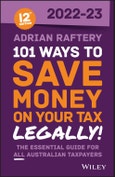An essential money-saving resource for every Australian who pays tax - updated for the 2022-2023 tax year and including the latest COVID-19 pandemic government relief measures.
101 Ways to Save Money on Your Tax - Legally! is the tax guide every Australian should own. Step-by-step instructions from Adrian Raftery, aka Mr. Taxman, will show you how to leverage every available deduction to lower your tax bill and keep more of your hard-earned money. Thoroughly updated for the 2022-2023 tax year, this new edition gives you the up-to-date information on changes to the tax codes as well as the latest updates to COVID-19 pandemic government relief measures.
Tax laws are constantly changing, but you don’t have to pore over piles of legislation to file your tax accurately and completely - that’s what Mr. Taxman is here for. Don’t let yourself become one of the people who overpay. Find out what you actually owe, and prepare for even better savings next year. This guide removes the stress and confusion from tax season and helps you file on time with no mistakes. Whether you're an individual, married couple, investor, business owner or pensioner, this guide will help you:
- understand how your taxes have changed for 2022-2023
- reduce your tax bill, potentially by $100s or $1000s
- learn plenty of expert tips, avoid tax traps and find the answers to frequently-asked questions
- explore topics such as medical expenses, levies, shares, property, education, business and family expenses, superannuation and much more
- protect yourself from errors, audits, overpayments and other common problems.
When it's time to file your tax, turn to 101 Ways to Save Money on Your Tax - Legally! Maximise your deductions and get the best possible tax return. Don’t pay more than you have to. Mr. Taxman is here to help.
Table of Contents
About the Author xi
How to Use This Book xiii
Introduction xv
Part I You and Your Family 1
1 Marriage 2
2 Income splitting 4
3 Dependant (invalid and carer) tax offset 6
4 Children 8
5 Payments for new parents 10
6 Child care 12
7 Low-income earners 15
8 Senior and pensioner tax offset 17
9 Other government benefits 19
10 Family breakdown 22
11 Death 24
12 Family trusts 26
Part II Your Employment 29
13 Car usage 31
14 Methods to claim car travel 33
15 Travel 35
16 Uniform 37
17 Home office 39
18 Other work-related deductions 43
19 Keeping those receipts 46
20 ATO hit lists 49
21 Redundancy 51
22 Working a second job 53
23 Salary sacrifice 55
24 Fringe benefits 57
25 Living-away-from-home allowance 62
Part III Your Education 67
26 Claiming self-education expenses 68
27 The $250 threshold 72
28 Student loans 74
29 Austudy and ABSTUDY 81
30 Scholarships 83
31 School building funds 85
32 Education savings plans 87
Part IV Your Investment Property 91
33 Negative gearing 93
34 Interest 95
35 Depreciation and low-value pooling 98
36 Repairs and maintenance 102
37 Borrowing and legal expenses 104
38 Other rental property deductions 108
39 Foreign investment properties 111
40 Capital gains tax 112
41 PAYG withholding variation 115
42 Co-ownership of your investment property 117
Part V Your Shares 121
43 Dividends 122
44 Shares owned by low income earners 128
45 Borrowing to buy shares 131
46 Other share deductions 133
47 Capital gains tax on shares 134
48 Realising capital losses 136
49 Inheriting share portfolios 138
50 Share traders versus share investors 140
51 Rights and options 142
52 Employee share schemes 144
53 Share portfolios within self managed superannuation funds 146
54 Cryptocurrency 148
Part VI Your Superannuation 153
55 Contribution limits 156
56 Transfer balance cap 159
57 Downsizer contribution 162
58 Compulsory employer contributions 165
59 Salary sacrifice 167
60 Division 293 tax 170
61 Super co-contribution 172
62 Transferring foreign super 175
63 Self managed superannuation funds 177
64 Buying property within SMSFs 180
65 Gearing through a super fund 182
66 Accessing your super 184
67 Transition to retirement 187
68 Account-based pensions 189
69 Death benefits 191
70 Lost or unclaimed super 193
Part VII Your Business 197
71 Choosing the right business structure 199
72 Tax obligations 203
73 Record keeping 207
74 Deferring tax 209
75 Trading stock 211
76 Bad debts 212
77 Home-based businesses 214
78 Sharing economy 216
79 Employing people 218
80 Single touch payroll 222
81 Tax concessions and offsets 225
82 Selling or closing down 233
83 Personal services income 235
84 Non-commercial losses 237
85 Division 7A loans by private companies 238
86 Franchising 241
87 Crowdfunding 242
88 Loss carry back tax offset 244
Part VIII Miscellaneous 247
89 Overseas income 247
90 Getting a great tax accountant 250
91 Lodging your tax return 252
92 Amending returns and objecting to assessments 255
93 ATO data matching 257
94 Problems paying your tax 261
95 Estate planning 262
96 Private ancillary funds 267
97 Levies 270
98 Zone and overseas forces tax offsets 273
99 Tax-effective investments 275
100 Tax planning as a 365-day process 277
101 Just do it! 278
Glossary 281
Bibliography 299
Index 301








